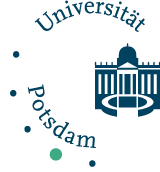Digitilization "among" dinosaurs ? On the Trail of Administrative Digitilization in Germany and Switzerland
On 07.11.22, the panel discussion on the digitilization of the public sector in Europe, organized jointly by the Zurich University of Applied Sciences (ZAHW) and the University of Potsdam, took place at the Berlin Museum of Natural History. The "Zurich meets Berlin" event featured Michael Müller, Member of the German Bundestag and Governing Mayor of Berlin from 2014 to 2021, Carmen Walker Späh, Minister for Economic Affairs of the Canton of Zurich, and Roman-Francesco Rogat, MdA, as well as members of the professoriate of the ZHAW School of Management and Law, the University of Zurich, and the University of Potsdam.
But do the primeval dinosaur skeletons in the museum's Sauriersaal stand as a symbol for administrative digitilization in Germany? At first, the venue seemed contrary to the topic of digitalization. However, the participants did not miss the opportunity to draw metaphorical parallels again and again in order to characterize the "administrative digitization that has stopped halfway" as described by Prof. Kuhlmann.
Based on two informative keynotes by Prof. Reto Steiner and Prof. Sabine Kuhlmann, a lively discussion developed, moderated by Prof. Isabella Proeller. Harald Gall, Professor of Software Engineering at the University of Zurich, stated that the debate in public is too often driven by generalities. For example, simple chatbots are already included under the umbrella term of artificial intelligence. At its core, however, it is about the digitalization of business processes, a concept and approach that has been known since the 1980s.
Michael Müller also addressed the function of high expectations as drivers of digitization. He said it was very important to him to emphasize that in the context of the political discussion about digitalization, financial savings were not the top political goal. Of course, all political players would support the topic in the short term if financial savings were expected. But sustainable improvements require not only time resources and a differentiated strategy, but also a high number of financial investments over years. Otherwise, the resulting drop-off after non-achievement of possible promised savings targets would become a central problem of this important transformation.
The other panelists were also very motivated to go ahead with this topic in practice and research. However, many considerations often have to be made, which in some cases delay decisions and further developments. Carmen Walker-Späh cited the example of cashless payment on buses via app, which would be very difficult for older people and children. The dualism of digital and analog still has to be taken into account here. However, one overarching insight became clear in the discussion: The digital transformation of the administration is no longer a pure technology issue, but rather one of organization, culture and, in particular, the involvement of employees and citizens.
As part of the DIGILOG research project funded by the DFG and the SNF, the researchers involved from the ZHAW, the University of Potsdam and the Vienna University of Economics and Business Administration will continue to explore the topic in greater depth over the next three years.




